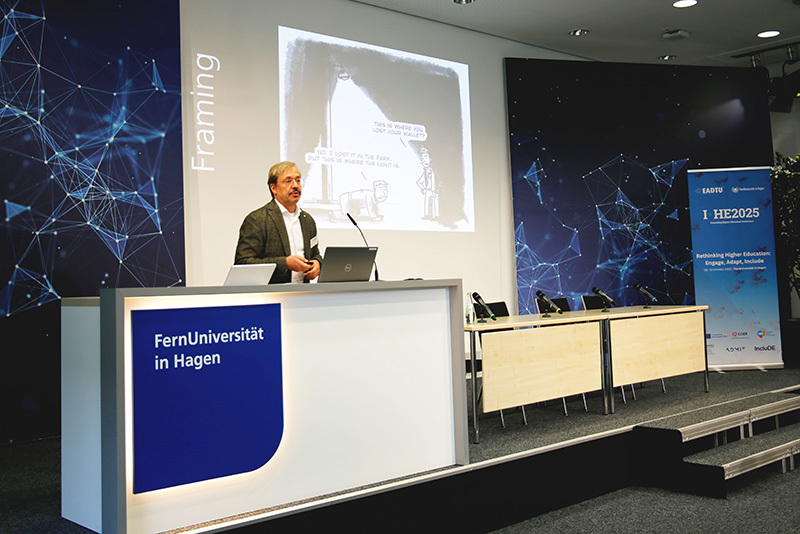News
Home game at the 'Innovating Higher Education' conference.
[20.10.2025]At the “Innovating Higher Education” conference held at the FernUniversität campus in Hagen, the CATALPA researchers presented a wide range of interdisciplinary contributions. These included 12 presentations on topics such as negative stereotypes affecting certain student groups, AI tools for providing detailed and personalised feedback, and building resilient universities in times of crisis.
 Photo: FernUniversität
Photo: FernUniversität
Representatives from the ten partner universities, ranging from Iceland to Cyprus and Portugal to Latvia, exchanged insights, experiences and visions for the future of learning and teaching.
From CATALPA's perspective, Marcus Specht's concluding keynote speech was a key moment. In his presentation on learning analytics and data-enhanced education, he explored the knowledge that can be gained through learner data and its potential to improve learning outcomes. According to the researcher, FernUni offers a unique environment as a 'data university' thanks to its learning analytics system.
How innovative are universities? How can technology help to overcome the typical challenges of distance learning? How can AI-generated feedback be used to improve learning outcomes? How can AI support multilingual courses? These questions were addressed by CATALPA researchers in their sessions.
-
In digital learning environments, feedback provided by instructors on students' solutions does not scale for large classes. AI-generated feedback can provide important support in this area because it is generally accurate, relevant, and coherent. GPT-4 Turbo and LLaMA3 performed best.
-
Interjector is a generative AI-powered web application that captures speech via a user's microphone. It transcribes the speech in real time and can optionally translate or summarize the content. Interjector can also generate other real-time insights.
-
Retrieval-augmented generation (RAG) has emerged as a promising solution to improve the factual accuracy of responses generated by large language models (LLMs). The main challenge in education is integrating LLMs into Learning Management Systems without disrupting self-directed learning or course pacing. Their use must align with learners’ knowledge and progression.
-
CATALPA member Florence Kristin Lehnert pursues a different approach to futurology. She uses design fiction to develop plausible yet fictional future scenarios. In the workshop she developed, participants explored provocative, non-idealized futures. The workshop provided an opportunity to critically and creatively rethink dominant narratives about AI in education.
-
Michael Hanses investigates why existing educational data architectures in higher education —educational data management, learner record stores, educational data warehouses, learning-analytics platforms — fail to meet researchers' and users' needs. He identifies the functional requirements that a “next-generation” educational data architecture must satisfy to close this gap.
-
To counter the challenges of distance education, a learning-platform is developed that allows lecturers to scalably create personalized exercises and automated feedback with integrated quality control mechanisms, and learners to work on personalized exercises, receive immediate feedback and anonymously critique learning-material.
-
In times of crises universities are challenged by new events that threaten the university’s core. In this context, organizational resilience is a vital mechanism. Schäfer aims to deliver real-world content by developing a practice-oriented view on universities. He sheds light on how organizational resilience can be integrated into the core of universities building on leadership and strategy, infrastructures and resources, recognition and motivation.
-
Generative AI (genAI) promises scalable formative feedback in higher education but raises questions about uptake, perceptions, and effects on learning. Findings around COFFEE, a lecturer-endorsed, institutionally safeguarded LLM-based feedback tool, in distance-learning modules suggest: curiosity-driven motivation underpins adoption and LLM-mediated feedback may yield incremental, task-adjacent benefits under greater engagement.
-
CSCL groups with high sociodemographic and high task-related diversity show lower group cohesion during collaboration. Social identity threat predicted lower sense of belonging to the CSCL group and in turn lower motivation to initiate and maintain social relations with other group members. Implementing preventive measures and adaptive interventions can minimize these risks.
-
Students performed better on those items in the post-test that they had already seen (without feedback) in the quiz before the lecture unit. Importantly, there was also a general beneficial effect of pre-testing: Even the quiz items not shown in the pre-test profited from that the specific lecture unit came with a pre-test.

